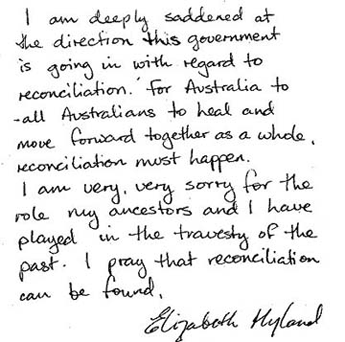History
Timeline results for 1970 to 1999
Found 232 results for your search. Showing page 12 of 12.
Year from 1970, year to 1999
1998
-
Aboriginal athlete and Olympic gold medallist, Cathy Freeman, receives the Australian of the Year award. ⇒ Famous Aboriginal people
-
Nova Peris wins gold in the 200m final and the 4x100m relay at the Commonwealth Games in Kuala Lumpur, becoming the first Australian to win international gold medals in two different sports, hockey and relay.
-
Australians for Native Title (ANT) launches the Sorry Books campaign, an opportunity for everyday Australians to give a "people’s apology" for past wrongs to Aboriginal people in lieu of the federal government's refusal to make a formal apology to the Stolen Generations. ANT circulated about 1,000 books over four months in libraries, museums, churches, shops, art galleries and schools.
The UNESCO added the collection of Sorry Books to its Memory of the World Register on 10 August 2004, in recognition of their historical and social significance.


Sample Sorry Book entries. Children, celebrities, migrants and visitors alike signed Sorry Books. [1] -
One year after the Bringing Them Home report the first Sorry Day is marked by hundreds of activities around the country. The Australian federal government does not take part in ‘Sorry Day’, saying people who removed Aboriginal children thought they were doing the right thing and people now should not have to say sorry for what people did in the past. Over 1 million signatures in thousands of Sorry Books speak a different language.
-
HREOC releases the Social Justice Report 1998, which includes a summary of responses from the churches, and non-Indigenous community to the inquiry's recommendations plus an Implementation Progress Report.
-
Prime Minister John Howard vehemently opposes a treaty, instead insisting on non-binding recognition: "I hope we have some kind of written understanding. I don't like the idea of a treaty because it implies that we are two nations. We are not, we are one nation. We are all Australians before anything else, one indivisible nation.
"But I would certainly be in favour of a document that recognises the prior occupation of this country by the indigenous people, recognising their place as part of the Australian community and their right to preserve their distinctive culture. But within the notion of one undivided united Australian community where our first and foremost allegiance is to Australia and nothing else."
1999
-
Federal parliament issues a statement of sincere regret over the forced removal of Aboriginal children from their families.
-
16-year-old Daniel Walbidi, from Yulparija, walks into Broome’s Short Street Gallery and asks owner Emily Rohr for painting supplies, inspiring his Yulparija elders, aged in their 70s and 80s, to start painting the stories of their ancestral desert lands they had left more than 40 years prior, and thus sparking an art movement. He went on to become one of Australia’s finest contemporary artists.
-
Mandatory sentencing in Western Australia and the Northern Territory becomes a national issue. Many call for these laws to be overturned because they have greater impact on Indigenous children than on non-Indigenous children.
-
Forced by a growing number of complaints of racial discrimination the Queensland government agrees to make a $25 million payout to thousands of Indigenous people who were employed by previous governments on Aboriginal reserves and paid at wages under the award rate in the years 1975 to 1986. The individual payout is $7,000.
It was the first time any Queensland government openly admitted responsibility for discrimination and by far the largest settlement by any employer in respect of a discrimination matter.
I grew up hungry. My hunger and malnutrition were a direct result of my family not being paid their full wages and entitlements.
— Yvonne Butler, admitted to hospital for malnutrition in 1957 [2] -
Federal Parliament issues a statement of deep and sincere regret over the forced removal of Aboriginal children from their families.
-
Jimmy Little is inducted into the Hall of Fame of the Australian Recording Industry Association (ARIA) Music Awards.
References
View article sources (2)
[1]
Australian Institute Of Aboriginal And Torres Strait Islander Studies, Sorry Books Exhibition, www.aiatsis.gov.au/collections/exhibitions/sorrybooks/introduction.html
[2]
Stolen Wages committee submissions, www.aph.gov.au/Parliamentary_Business/Committees/Senate/Legal_and_Constitutional_Affairs/Completed_inquiries/2004-07/stolen_wages/submissions/sublist, submission #21

